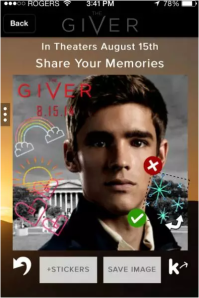AdAge: Young-Adult Flick ‘The Giver’ Gets Ad Campaign on Kik Messenger App
There is an old expression among us marketers when it comes to targeting a consumer audience. “Fish where the fish are.” In an age of booming technology and evolving media, reaching young consumers is becoming ever more difficult. The marketers at The Weinstein Company’s are looking for a new breakthrough way to reach millennials in promotion of their new movie “The Giver.” Instead of developing a flashing facebook campaign or investing in a robust twitter activation, Weinstien is turning to the mobile messaging app Kik.
 Unlike a normal advertising platform, Kik transformed the movie’s ad into a “card” containing the film’s trailer, trivia questions and film-branded stickers, that allows it’s users to share or “kik,” in the parlance of the platform that take place inside the app. Kik is the third-most downloaded messenger app among both iPhone and Android smartphone users in the U.S. and is averaging over 2 million new signups globally every week. The design of the campaign allows Kik users to link to the card, interact with its content and “kik” it to friends more than 1.5 million times before the movie comes out on August 15. The article features an interview with the senior VP of marketing at the Weinstien group that explains their shift in strategy towards a more integrated 360 campaign. Though it is just a part of a wide digital effort, marketing for “The Giver” is using more than 12 digital platforms, and Weinstein’s Kik campaign is part of a broader push into uncharted digital territory.
Unlike a normal advertising platform, Kik transformed the movie’s ad into a “card” containing the film’s trailer, trivia questions and film-branded stickers, that allows it’s users to share or “kik,” in the parlance of the platform that take place inside the app. Kik is the third-most downloaded messenger app among both iPhone and Android smartphone users in the U.S. and is averaging over 2 million new signups globally every week. The design of the campaign allows Kik users to link to the card, interact with its content and “kik” it to friends more than 1.5 million times before the movie comes out on August 15. The article features an interview with the senior VP of marketing at the Weinstien group that explains their shift in strategy towards a more integrated 360 campaign. Though it is just a part of a wide digital effort, marketing for “The Giver” is using more than 12 digital platforms, and Weinstein’s Kik campaign is part of a broader push into uncharted digital territory.
We talked a lot in class about the shift to mobile platforms. Mobile messaging apps have in the past year or so are becoming a key executional media for marketers and advertisers. The article sites that brands have begun toying with platforms like Snapchat and Tango, exploring them as possible venues for e-commerce, selling branded content like stickers, or as a good destination for native advertisements.
However, that downfall of using a new service like Kik is the ability to target their users. The platform asks it’s users for permission to access their contacts and location, while they never tracks their browsing history nor saves their conversations. Therefore Kik offers its ad partners’ a very limited ability to track user behavior. More tracking would mean better insights and improved targeting for brands, but it would also mean limiting user privacy, something that had been a point of emphasis during the platform’s growth.
Question for the class: We often like a new page or download a new app and click through all of the permission settings without a second thought. As more and more advertisers are using social platforms, will users be as likely to “click accept.” Does granting apps permission like “the ability to post on your behalf” or “access your friends and personal information” scare you? If so, does it change the way you use those platforms?
